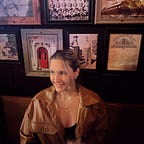An Evening with Dr. Elizabeth Sharrow: Title IX in Historical Perspective
By: Alise Adornato
On Wednesday, September 7, 2022, the Albert Lepage Center for History in the Public Interest virtually hosted Dr. Elizabeth Sharrow, an associate professor of History and Public Policy at The University of Massachusetts Amherst, to reflect on the impact of Title IX on the legislation’s 50th anniversary. The presentation and question and answer session was moderated by Villanova History Department Instructor Gina Talley. Watch the recording here.
Dr. Elizabeth Sharrow is an associate professor of History and Public Policy at the University of Massachusetts Amherst. Dr. Sharrow’s academic background is in Public Policy, Gender Law and Sports Policy, Political Science, and Feminist and Critical Studies in Sexuality. Taken together, her research culminates in the intersectionality of politics and gender. Focusing on the successes and shortcomings of Title IX, Dr. Sharrow’s talk considered how politics has influenced society’s social understanding of sex and gender both implicitly and explicitly.
Passed in 1972, Title IX of the Education Amendments has maintained a reputation for being the hallmark of feminist policy. A Civil Rights’ legislation intertwined with discrimination in athletics, the policy circumnavigates controversy surrounding gender equality by engaging the issue through the perspective of popularized and socially accepted athletics. However, as Dr. Sharrow discusses, the policy has propagated constrained views of gender and sex, creating new conditions for bias.
Although aimed to end discrimination “on the basis of sex”, Title IX defines sex as a naturalized part of the female body, manufacturing opportunities for gender policing in athletics. Dr. Sharrow analyzes this policing to emerge most when a person identifying as female in athletics does not appear to some observers outwardly feminine, such as in cases of transgender athletes. The embodied politics of gender policing has added to the obstacles Title IX faces in the modern-day. In turn, sexual politics — in the form of fear of lesbianism in contrast with heterosexuality — intersecting with social stratification based on ability, class, and race contextualize the latent shortcomings of equality under Title IX.
“Separate but equal” dominates the dialogue encircling men’s and women’s athletics. In her presentation, Dr. Sharrow indicates how detrimental this phrase has been to the strides of Title IX. She argues that in the classroom, men and women are to be viewed as one and the same, whereas in a sports setting, sex and gender are conscious and apparent. The cycle, as Dr. Sharrow repeatedly describes, is a coercive form of sex segregation, accepting the female body as inferior. Still, Title IX has worked to increase female athletic participation over the last fifty years, yet the subsidiary nature of female athletics persists.
Examining a graph depicting US College Athletics Participation from 1967–2021, Dr. Sharrow acknowledges the success of the rising participation of women in athletics, parallel to the trend of rising participation seen in men’s athletics. However, she presents the argument that if Title IX had truly worked then these lines would have converged. Society and politics have not reached the point of challenging the status quo. Men’s athletics receive substantially greater financial support than women’s athletics, and policies in place, like Title IX, directed to create guidelines for sex-based equality, often favor upper-class, white women. Unless new policies are implemented, the ceiling of positive impact for women will be reached. Thus, Dr. Sharrow asked attendees to question what can construct and constrain change and to recognize the intersectionality of social norms and politics. Fifty years after Title IX, it is imperative to celebrate its successes, yet acknowledge its fundamental shortcomings and demand more must be done.
